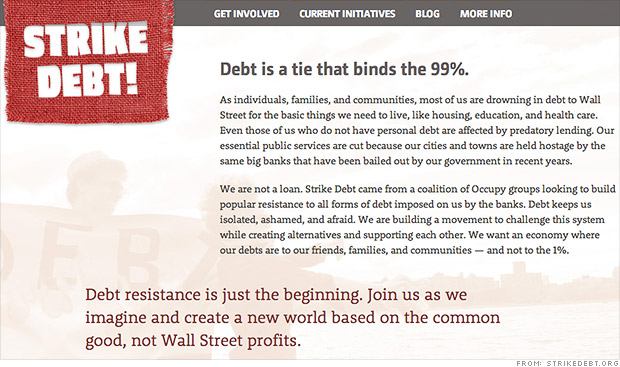For some reason I can't post to your individual blogs on waging a living.
It's understandable that you found the film Depressing. It underscores that employment does not guarantee economic security and for low wage workers often means terrible poverty. And terrible stress. This is not a reality that we often hear about in the media or from conservative discourse which often argues that people are poor because they have failed somehow or lack certain values.
One section of the film that I find,most disturbing is when the woman who is trying to finish college talks to her professor about her problems with the course. He urges her to apply herself!
Jacki posted a brief commentary on the film which was really interesting. Though if I had been that reporter I would have flipped his solutions and started with expanded social and political support
You've posted good links.
Monday, March 25, 2013
Friday, March 15, 2013
Remember our speaker on STRIKE DEBT!
 Occupy Wall Street offshoot, Strike Debt, is buying people's emergency room debts for pennies on the dollar and forgiving them.
Occupy Wall Street offshoot, Strike Debt, is buying people's emergency room debts for pennies on the dollar and forgiving them.
When a bank, lender or other company, like a
hospital, is unable to collect on a debt, it typically sells it to debt
buyers or collectors -- often at a much lower price than the original
amount owed since the odds of collecting the money are low. Whoever buys
the debt then attempts to get the money from the debtor.
Related: Debt collection horror stories
Citing the large number of bankruptcies that stem from medical bills, Strike Debt's mission is to stop this collection cycle and abolish the debt altogether.
"Our privatized health care system buries ordinary people in debt all to enrich the 1%," the group said.
The more than $1 million in debt the group eliminated belonged to 1,064 people, amounting to an average of about $900 in debt per person. These randomly-selected people will receive notices explaining that their debt has been forgiven.
The organization spent about $21,000 to purchase the debt, using money raised from supporters.
Related: What business can learn from Occupy Wall Street
To rally the troops around its debt-busting initiative, Occupy's Strike Debt is planning protests later this month against private insurance companies and other events to raise awareness about hospital closings due to excessive amounts of debt.
Strike Debt originally launched its campaign and fundraising efforts in November, abolishing more than $100,000 in consumer debt before the end of 2012.
http://money.cnn.com/2013/03/15/pf/occupy-wall-street-debt/index.html
Occupy offshoot forgives $1 million in random people's debt
By Blake Ellis @CNNMoney March 15, 2013: 3:40 PM ET Occupy Wall Street offshoot, Strike Debt, is buying people's emergency room debts for pennies on the dollar and forgiving them.
Occupy Wall Street offshoot, Strike Debt, is buying people's emergency room debts for pennies on the dollar and forgiving them.
NEW YORK (CNNMoney)
Occupy Wall Street offshoot, Strike Debt, announced Friday that it has abolished $1.1 million in medical debt for more than 1,000 people.
The protest group did this by buying emergency room debts for pennies on the dollar and then simply forgiving them rather than trying to collect the money, Strike Debt said in a statement.Related: Debt collection horror stories
Citing the large number of bankruptcies that stem from medical bills, Strike Debt's mission is to stop this collection cycle and abolish the debt altogether.
"Our privatized health care system buries ordinary people in debt all to enrich the 1%," the group said.
The more than $1 million in debt the group eliminated belonged to 1,064 people, amounting to an average of about $900 in debt per person. These randomly-selected people will receive notices explaining that their debt has been forgiven.
The organization spent about $21,000 to purchase the debt, using money raised from supporters.
Related: What business can learn from Occupy Wall Street
To rally the troops around its debt-busting initiative, Occupy's Strike Debt is planning protests later this month against private insurance companies and other events to raise awareness about hospital closings due to excessive amounts of debt.
Strike Debt originally launched its campaign and fundraising efforts in November, abolishing more than $100,000 in consumer debt before the end of 2012.
http://money.cnn.com/2013/03/15/pf/occupy-wall-street-debt/index.html
Wednesday, March 6, 2013
Sunday, March 3, 2013
Classism in popular culture
Here are two videos posted on youtube about people at Walmart. I think they fit with the piece of this week's reading that addresses classism.
http://www.youtube.com/watch?v=h48Uff3XD0s
http://www.youtube.com/watch?v=ghrDIQ-K8mg
and a short article on Honey Boo Boo reality show, which the author refers to as ‘the poverty voyeurism comedy tour!;
http://www.clutchmagonline.com/2012/09/whats-wrong-with-honey-boo-boo/#.UEoQi-5vQpQ.email/
http://www.youtube.com/watch?v=h48Uff3XD0s
http://www.youtube.com/watch?v=ghrDIQ-K8mg
and a short article on Honey Boo Boo reality show, which the author refers to as ‘the poverty voyeurism comedy tour!;
http://www.clutchmagonline.com/2012/09/whats-wrong-with-honey-boo-boo/#.UEoQi-5vQpQ.email/
Subscribe to:
Posts (Atom)